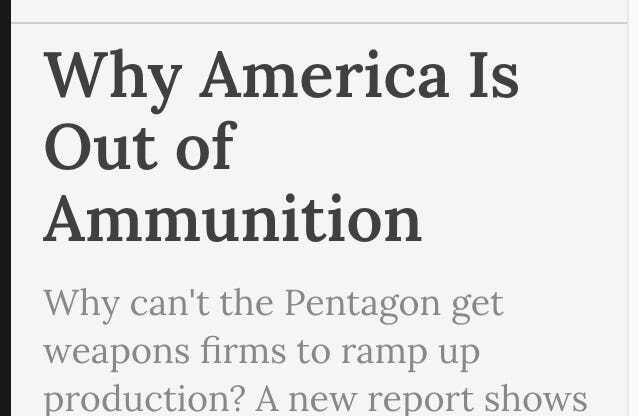- cross-posted to:
- liberalism@lemmy.sdf.org
- politics@beehaw.org
- cross-posted to:
- liberalism@lemmy.sdf.org
- politics@beehaw.org
It’s a shame that I can’t read the whole argument without logging in, but I’m not registering for this.
Dude is a contributor to the Federalist Society. Not to go all ad hominem but I already know what I need to know.
It’s buried in the pop up but there is a “continue reading” link.
This is the best summary I could come up with:
He’s drafted important legislation, and has recently been focusing on the airline industry, labor issues, and a lot of the major antitrust litigation I’ve written about here, including the trials of the Meta-Within merger, the Microsoft-Activision acquisition and the Google monopolization case.
One of the more important side stories to the recent wars in Ukraine and Israel, and competition with China over Taiwan, is that the U.S. defense industrial base, composed of 200k plus corporations, is being forced to actually build weapons again.
In Lake City, Missouri, the largest small arms ammunition plant in the world has decided all ammo production is going to the military, meaning that there is going to be a domestic shortage for hunters, sportsmen, and maybe even police.
To put it in boring GAO-speak, Pentagon “officials could not say with certainty how many defense-related M&A now occur annually because they no longer track or maintain data on all M&A in the defense industrial base.” So the DOD is almost totally blind to the corporate owners of contractors and subcontractors, which might be one reason that, say, Chinese alloys are being discovered in sensitive weapons systems like the state of the art F-35.
They do no analysis of industry sectors, as their “M&A office is not collecting robust data or conducting recurring trend analyses that could help them identify M&A in risky areas of consolidation among defense suppliers.”
The FTC and DOJ now have significant amounts of national security-related information on mergers due to a Congressional change in pre-merger notification laws in 2022, so the DOD could easily do a better job of tracking what’s happening in the defense base.
The original article contains 1,767 words, the summary contains 274 words. Saved 84%. I’m a bot and I’m open source!
I can’t speak to the military market, but on the CONSUMER market, the pandemic exposed a HUGE bottleneck.
A bullet consists of a few key pieces… the projectile itself, gunpowder, the shell that holds the whole thing together, and the primer which is what gets struck by the firing pin and makes the whole thing work.
Most of this is dead simple tech, people have been making their own projectiles, shells, and gunpowder for centuries.
But during the pandemic, the supply line on primers fell apart, and if you can’t get primers, you can’t make bullets.
https://www.outdoorlife.com/guns/ammo-shortage-2023/
“Fiocchi, the Italian ammunition manufacturer, announced in November (2022) that it is building a $41 million primer manufacturing facility in Little Rock, Arkansas. The press release announcing the plant’s establishment noted that there are only five other primer manufacturing operations in the U.S. At least one other large manufacturer is looking at establishing a primer production operation in order to satisfy demand, but a principal for the company noted that groundbreaking for the new facility is at least a year away.”
The same article notes the other problem in the post pandemic world… staffing. Even if you have enough primers, you still need the people to make the bullets and it’s not like a construction line is a work from home gig.
"Mike Stock, general manager of Winchester Ammunition’s Oxford, Mississippi, plant:
“It’s getting a little better every month, but I could pay an employee all the overtime they would ever want to make right now,” says Stock, whose facility is absorbing part of the $145 million contract Winchester received last year to deliver pistol ammunition to the U.S. Army. “Put it this way, we can’t hire enough people quickly enough.”"
And they’re choosing what to make, in the above example, they’re making pistol ammo for an Army contract, well, that means their lines aren’t making rifle ammo for anyone else. Common calibers get precedent, uncommon or older ones get lost in the shuffle.




